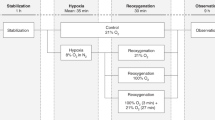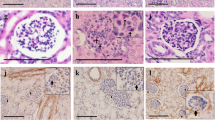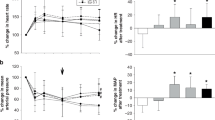Abstract
Summary: This investigation was undertaken to determine the nature of acute alterations in renal function following the production of hypoxemia, hypercarbia, and acidosis in newborn piglets 6–96 hr of age. After completion of the surgical procedure piglets were allowed to recover from the effects of anesthesia. When respiratory dead space was increased arterial oxygen tension decreased whereas arterial carbon dioxide tension and hydrogen ion concentration increased. There was little change in glomerular filtration rate. Total renal blood flow decreased and renal vascular resistance increased significantly (504 ± 78 mm Hg/liter/mm/m2 to 1422 ± 504). There was no change in distribution of intrarenal blood flow. Sodium excretion and urinary flow rate demonstrated significant parallel increases following the increase in dead space. Plasma renin concentration increased from 67 to 110 ng/ml.
Speculation: Hypoxia, hypercarbia, and acidosis produced changes in renal function in newborn piglets. Therapeutic approaches to the newborn human with respiratory distress must consider the potential for modifications of renal function which may be detrimental to the infant.
Similar content being viewed by others
Log in or create a free account to read this content
Gain free access to this article, as well as selected content from this journal and more on nature.com
or
Author information
Authors and Affiliations
Rights and permissions
About this article
Cite this article
Alward, C., Hook, J., Helmrath, T. et al. Effects of Asphyxia on Renal Function in the Newborn Piglet. Pediatr Res 12, 225–228 (1978). https://doi.org/10.1203/00006450-197803000-00013
Issue date:
DOI: https://doi.org/10.1203/00006450-197803000-00013



